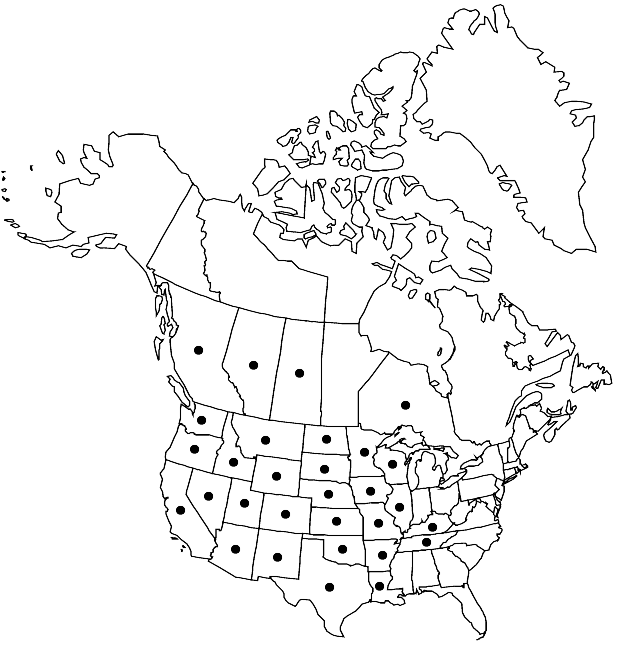Rorippa sinuata
Key Spring Fl. Manhattan, 18. 1894.
Perennials; (rhizomatous or with creeping roots); sparsely to moderately pubescent, (trichomes hemispherical, vesicular). Stems (many to few from base), decumbent or prostrate, branched distally, 1–4.2 (–5) dm, (pubescent proximally). Basal leaves not rosulate; blade margins pinnatifid. Cauline leaves sessile; blade oblong to oblanceolate or lanceolate (lateral lobes oblong or ovate), (1.5–) 2.5–6.5 (–9) cm × 5–18 (–25) mm, base usually auriculate, rarely proximalmost not auriculate, margins pinnatifid to deeply sinuate, or (lateral lobes) dentate to sinuate or entire, (surfaces pubescent abaxially with vesicular trichomes on veins, glabrous adaxially). Racemes considerably elongated. Fruiting pedicels divaricate-ascending to horizontal, sigmoid or recurved, 4–12 (–14.5) mm. Flowers: sepals ascending, oblong, 2.2–3.7 (–4.5) × 1–1.8 mm; petals yellow, oblanceolate to spatulate, (2.7–) 3.2–5.3 (–6) × 1.5–2.5 mm; median filaments 3–5.5 mm; anthers narrowly oblong, 1.2–1.7 mm. Fruits siliques, curved, oblong to lanceolate or linear, (4–) 5–12 (–16) × (1–) 1.5–2.5 mm; valves glabrous or pubescent; ovules (30–) 50–82 (–98) per ovary; style (0.8–) 1–2.5 (–3.5) mm. Seeds biseriate, yellowbrown, angled, cordiform, 0.7–1 mm (0.5–0.6 mm diam.), colliculate. 2n = 16.
Phenology: Flowering Apr–Aug.
Habitat: Shores of ponds and lakes, sandy banks, stream banks, fields, wet depressions, gravel banks, ditches, moist grounds
Elevation: 0-2600 m
Distribution

Alta., B.C., Ont., Sask., Ariz., Ark., Calif., Colo., Idaho, Ill., Iowa, Kans., Ky., La., Minn., Mo., Mont., Nebr., Nev., N.Mex., N.Dak., Okla., Oreg., S.Dak., Tenn., Tex., Utah, Wash., Wis., Wyo.
Discussion
Selected References
None.
Lower Taxa
"elongated" is not a number."thick" is not a number."dm" is not declared as a valid unit of measurement for this property."dm" is not declared as a valid unit of measurement for this property.